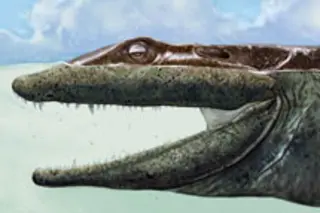Around 365 million years ago, a fishy, finned creature that resembled a small alligator clambered up on a sandbank and earned its place in evolutionary history. Researchers who recently discovered fossils of the animal, named Ventastega curonica, say it's the most primitive four-legged creature ever found. While it wasn't the first "fishapod" to lurch out of the water (that honor goes to the Tiktaalik, which accomplished the feat about 375 million years ago), its more primitive evolutionary stage gives researchers new information about the earliest four-legged creatures, or tetrapods.
Ventastega was first described from a few bone fragments unearthed in Latvia in 1994, but it took additional years of excavation and the discovery of remains from many more individuals before scientists had a good idea of what the creature looked like. The latest portrait to emerge, from an especially well-preserved find, reveals an animal with a part-fish, part-tetrapod skull and ...














